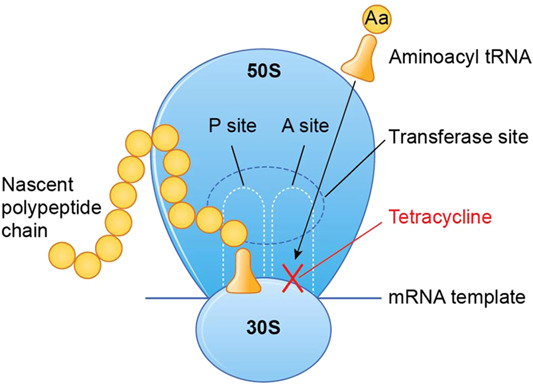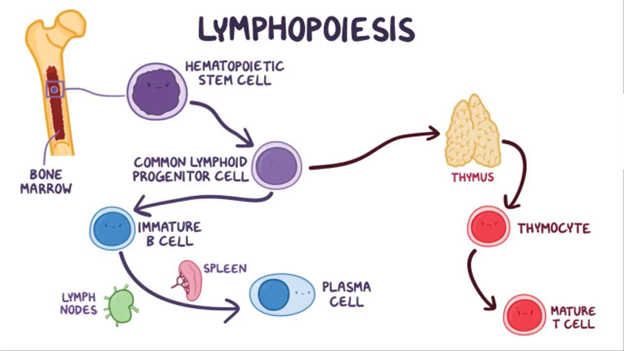A nursing student asks the nursing instructor about the mechanism of the bacteriostatic action of tetracycline. Which explanation is correct?
"Tetracycline inhibits protein synthesis."
"Tetracycline blocks RNA synthesis."
"Tetracycline degrades the bacterial cell wall."
"Tetracycline binds to magnesium ions."
The Correct Answer is A
A. "Tetracycline inhibits protein synthesis."
Explanation: Tetracycline antibiotics interfere with bacterial protein synthesis by binding to the bacterial ribosomes. This binding prevents the attachment of transfer RNA (tRNA) to the messenger RNA (mRNA) complex, effectively inhibiting the production of proteins that are crucial for bacterial growth and replication.
B. "Tetracycline blocks RNA synthesis."
Explanation: This statement is incorrect. Tetracycline primarily affects protein synthesis, not RNA synthesis. It doesn't block the creation of RNA molecules in bacteria.
C. "Tetracycline degrades the bacterial cell wall."
Explanation: This statement is incorrect. Tetracycline antibiotics do not target bacterial cell walls. Agents like penicillins and cephalosporins are examples of antibiotics that disrupt bacterial cell walls.
D. "Tetracycline binds to magnesium ions."
Explanation: This statement is incorrect. Tetracycline does bind to certain metal ions, but it's not primarily through magnesium ions. The binding to bacterial ribosomes is a key mechanism of action for tetracyclines.

Nursing Test Bank
Naxlex Comprehensive Predictor Exams
Related Questions
Correct Answer is A
Explanation
A. Ototoxicity and Nephrotoxicity:
Ototoxicity: Aminoglycosides can damage the inner ear structures, leading to hearing loss and balance issues.
Nephrotoxicity: These drugs can harm the kidneys, potentially causing acute kidney injury or chronic kidney disease. Monitoring kidney function is crucial to prevent renal damage.
B. Ototoxicity and Cardiotoxicity:
Ototoxicity: As mentioned above, aminoglycosides can damage the inner ear, affecting hearing and balance.
Cardiotoxicity: Aminoglycosides primarily affect the ears and kidneys; they do not directly target the heart. Cardiotoxicity is not a common side effect associated with aminoglycosides.
C. Hepatotoxicity and Nephrotoxicity:
Hepatotoxicity: This term refers to liver damage caused by drugs or toxins. Aminoglycosides are not known to cause liver problems; their primary concern is kidney damage.
Nephrotoxicity: As mentioned earlier, aminoglycosides can harm the kidneys, which is a well-known side effect.
D. Cardiotoxicity and Hepatotoxicity:
Cardiotoxicity: This term refers to the toxic effects on the heart, leading to various heart-related issues. Aminoglycosides do not primarily affect the heart; their main concerns are the ears (ototoxicity) and kidneys (nephrotoxicity).
Hepatotoxicity: Aminoglycosides are not typically associated with liver damage. They are primarily metabolized and excreted by the kidneys, which is why kidney monitoring is crucial during their use.
Correct Answer is B
Explanation
A. Gut-associated lymphoid tissue (GALT): GALT is a component of the mucosa-associated lymphoid tissue (MALT) and refers to the immune cells found in the gastrointestinal tract. These cells play a significant role in local immune responses in the gut.
B. Bone marrow: The bone marrow is the primary site of blood cell production in the body. It contains stem cells that can differentiate into various blood cells, including B cells. B cells mature in the bone marrow.
C. Thymus: The thymus is an organ located near the heart and is crucial for the development of T cells. T cells mature in the thymus, where they learn to recognize self from non-self antigens.
D. Lymph nodes: Lymph nodes are small, bean-shaped structures that produce and store cells that help fight infection. While they are essential parts of the immune system, B and T cells are not originally derived from lymph nodes.

Whether you are a student looking to ace your exams or a practicing nurse seeking to enhance your expertise , our nursing education contents will empower you with the confidence and competence to make a difference in the lives of patients and become a respected leader in the healthcare field.
Visit Naxlex, invest in your future and unlock endless possibilities with our unparalleled nursing education contents today
Report Wrong Answer on the Current Question
Do you disagree with the answer? If yes, what is your expected answer? Explain.
Kindly be descriptive with the issue you are facing.
